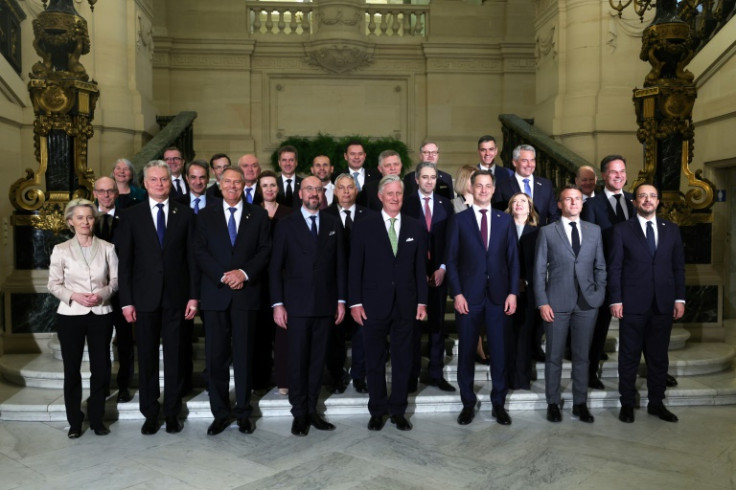EU Weighs Response To Russian 'Interference' In Election Runup

EU leaders were Wednesday weighing the bloc's response to suspicions of Russian meddling ahead of June elections in the bloc, with calls for new sanctions to target "malign activities" by Moscow.
Brussels has issued repeated warnings about Moscow sowing disinformation ahead of the polls, and seeking to weaken Western support for Ukraine as it fights off Russia's invasion.
The issue reared its head dramatically in recent weeks after Czech intelligence uncovered evidence EU lawmakers took money to spread Kremlin propaganda through a Prague-based news site -- allegations now under investigation in Belgium which hosts the EU's top institutions.
Together the prime ministers of Belgium and the Czech Republic, Alexander De Croo and Petr Fiala, appealed to fellow EU leaders at a summit in Brussels to consider new sanctions against Russia.
"We have a serious allegation that they have played an active role in trying to influence our democracy," De Croo said on arrival.
"We have to be very clear that attempts like this are not acceptable, and that we have to do everything to defend our democracy."
In a joint letter, De Croo and Fiala argued for "a new EU restrictive measure regime aimed to counter Russian malign activities."
"We must arm ourselves against this, both at national and European level," they wrote in the letter to EU heads of state, Parliament President Roberta Metsola, Commission chief Ursula von der Leyen and Council President Charles Michel.
Addressing the summit in Brussels, Metsola echoed their warning, saying Russian attempts to "skew narratives and strengthen pro-Kremlin sentiment" ahead of June polls were no longer "just a threat, but a possibility that we must be ready to counter."
"The European Parliament stands ready to support the Member States in pushing-back and addressing any malign interference with our democratic decision-making processes in every way that it can," she said.
In their draft summit conclusions, EU leaders alluded to the threat, vowing to "closely monitor and contain" risks including "foreign information manipulation and interference in electoral processes."
But with Russia-friendly leaders Hungary's Viktor Orban and Slovakia's Robert Fico in the room there appeared little chance they would go much further in the politically charged lead-up to June's European elections.
Russian disinformation tactics identified by EU officials go beyond publishing outright false information. Mixing in nuggets of facts into false stories can confuse or mislead readers so that they distrust all news sources -- including reputable ones.
The EU parliament allegations revolve around a site called Voice of Europe, which is known for publishing stories repeating Russian messaging and giving airtime to guests who do so.
Prague has slapped sanctions on Voice of Europe and two pro-Kremlin Ukrainian politicians -- Viktor Medvedchuk and Artem Marchevsky -- in relation to the network's activities.
The Greens grouping in the European Parliament and a Czech daily said the lawmakers under suspicion of voicing Russian propaganda on Voice of Europe came from Belgium, France, Germany, Hungary, the Netherlands and Poland.
News website Politico said it identified 16 EU lawmakers who had appeared on Voice of Europe, all of them far-right politicians.
EU lawmakers face strict rules regarding independence and ethics and can face penalties -- financial and otherwise -- if they violate them.
The probe by Belgium's federal prosecutor's office is investigating foreign individuals or organisations suspected of giving "donations, loans or advantages" to gain influence.
The European Parliament's main political groups have called for the legislature to also probe the alleged propaganda-peddling.
And the Belgian and Czech leaders also appealed for the European Public Prosecutor's Office and the European Anti-Fraud Office to be able to prosecute such political meddling.
© Copyright AFP 2024. All rights reserved.





















